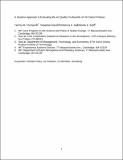| dc.contributor.author | Thompson, Tammy M | |
| dc.contributor.author | Rausch, Sebastian | |
| dc.contributor.author | Saari, Rebecca K | |
| dc.contributor.author | Selin, Noelle E | |
| dc.date.accessioned | 2025-06-13T16:50:21Z | |
| dc.date.available | 2025-06-13T16:50:21Z | |
| dc.date.issued | 2014-08-24 | |
| dc.identifier.uri | https://hdl.handle.net/1721.1/159403 | |
| dc.description.abstract | Because human activities emit greenhouse gases (GHGs) and conventional air pollutants from common sources, policy designed to reduce GHGs can have co-benefits for air quality that may offset some or all of the near-term costs of GHG mitigation.We present a systems approach to quantify air quality co-benefits of US policies to reduce GHG (carbon) emissions. We assess health-related benefits from reduced ozone and particulate matter (PM2.5) by linking three advanced models, representing the full pathway from policy to pollutant damages. We also examine the sensitivity of co-benefits to key policyrelevant sources of uncertainty and variability. We find that monetized human health benefits associated with air quality improvements can offset 26-1,050% of the cost of US carbon policies. More flexible policies that minimize costs, such as cap-and-trade standards, have larger net co-benefits than policies that target specific sectors (electricity and transportation). Although air quality co-benefits can be comparable to policy costs for present-day air quality and near-term US carbon policies, potential co-benefits rapidly diminish as carbon policies become more stringent. | en_US |
| dc.language.iso | en | |
| dc.publisher | Springer Science and Business Media LLC | en_US |
| dc.relation.isversionof | 10.1038/nclimate2342 | en_US |
| dc.rights | Creative Commons Attribution-Noncommercial-ShareAlike | en_US |
| dc.rights.uri | http://creativecommons.org/licenses/by-nc-sa/4.0/ | en_US |
| dc.source | Springer Nature | en_US |
| dc.title | A systems approach to evaluating the air quality co-benefits of US carbon policies | en_US |
| dc.type | Article | en_US |
| dc.identifier.citation | Thompson, T., Rausch, S., Saari, R. et al. A systems approach to evaluating the air quality co-benefits of US carbon policies. Nature Clim Change 4, 917–923 (2014). | en_US |
| dc.contributor.department | Massachusetts Institute of Technology. Joint Program on the Science & Policy of Global Change | en_US |
| dc.contributor.department | Massachusetts Institute of Technology. Engineering Systems Division | en_US |
| dc.contributor.department | Massachusetts Institute of Technology. Department of Earth, Atmospheric, and Planetary Sciences | en_US |
| dc.relation.journal | Nature Climate Change | en_US |
| dc.eprint.version | Author's final manuscript | en_US |
| dc.type.uri | http://purl.org/eprint/type/JournalArticle | en_US |
| eprint.status | http://purl.org/eprint/status/PeerReviewed | en_US |
| dc.date.updated | 2025-06-13T16:36:29Z | |
| dspace.orderedauthors | Thompson, TM; Rausch, S; Saari, RK; Selin, NE | en_US |
| dspace.date.submission | 2025-06-13T16:36:33Z | |
| mit.journal.volume | 4 | en_US |
| mit.journal.issue | 10 | en_US |
| mit.license | OPEN_ACCESS_POLICY | |
| mit.metadata.status | Authority Work and Publication Information Needed | en_US |
